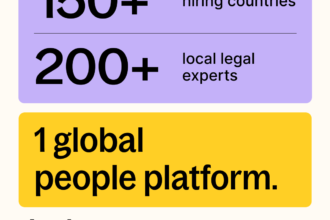Expanding a business globally or managing a distributed workforce requires the right employment solution to stay compliant and efficient. Two popular options are Employer of Record (EOR) and Professional Employer Organization (PEO). While both services help businesses manage HR, payroll, and compliance, they operate differently.
In this blog, we will explore the key differences between an EOR and a PEO, their advantages, and how to choose the right one for your business.
What is an Employer of Record (EOR)?
An Employer of Record (EOR) is a third-party organization that legally employs workers on behalf of a company in a foreign country. The EOR takes full responsibility for payroll, taxes, compliance, and employee benefits, allowing companies to hire without setting up a legal entity.
What is a Professional Employer Organization (PEO)?
A Professional Employer Organization (PEO) is a co-employment model where the PEO shares employer responsibilities with a company. While the business retains operational control, the PEO manages HR functions like payroll, benefits, and compliance within the same country where the company is legally registered.
Key Differences Between EOR and PEO
| Feature | Employer of Record (EOR) | Professional Employer Organization (PEO) |
|---|---|---|
| Legal Employer | EOR is the legal employer of record | Business remains the legal employer |
| Entity Requirement | No need to establish a local entity | Requires the business to have a legal entity in the country |
| Geographical Scope | Enables hiring in multiple countries | Usually operates within a single country |
| Compliance | Handles local labor laws, payroll, and taxes | Supports compliance but company is still legally responsible |
| HR & Payroll | Fully managed by EOR | Managed in partnership with the company |
| Worker Type | Best for hiring international employees | Best for domestic employees |
When to Choose an EOR?
A business should opt for an EOR if:
- It wants to hire employees in a country where it has no legal entity.
- It is expanding globally and wants to enter a new market quickly.
- It wants to mitigate compliance risks and avoid legal complexities.
- It prefers a hassle-free payroll and benefits management system.
When to Choose a PEO?
A PEO is a better option if:
- The business already has a legal entity in the country.
- It wants to outsource HR, payroll, and benefits but still retain employer status.
- It is looking for cost-effective HR solutions within the same country.
- It wants to improve employee benefits and compliance support while maintaining control over its workforce.
Conclusion
Both EOR and PEO services help businesses streamline HR and compliance, but the choice depends on business goals and expansion strategy. If your company is hiring internationally without a local entity, an EOR is the best solution. However, if you need HR outsourcing within a country where you already operate, a PEO may be a better fit.






